Oral Histories
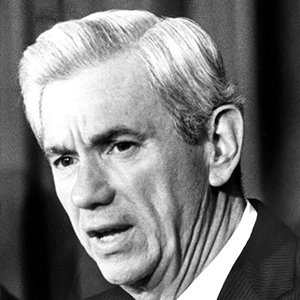
Reubin Askew
(1928-2014) was a prominent Florida politician who served in the Florida House of Representatives from 1958-1962 and the Florida Senate from 1962-1970. In 1970, he was elected as the 37th Governor of Florida and served two terms until 1979. He is widely remembered as being one of the state’s most effective governor’s, ranked by Harvard as one of the top 10 American governors of the 20th century. Askew reflects on his relationship with Chiles in the Florida Senate and later in Election of 1970.
Subjects: Rhea Chiles, Election of 1970 (gubernatorial), Election of 1970 (senatorial), University of Florida School of Law, Environmental reforms, Florida state legislature (1958-1970), Gubernatorial Election of 1990
| 10/19/06 Interview |
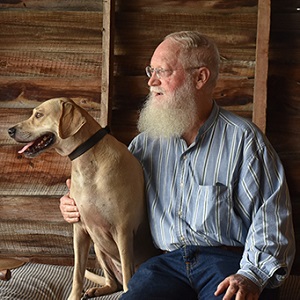
Judge Nelson Bailey
(1943- ) was born in Columbus, Ohio, and moved with his family as a child to Tavares, Florida. Bailey received BA and law degrees from Florida State University. He practiced privately for twenty-two years until appointed county judge of Palm Beach County by Lawton Chiles in 1995. Retiring from the bench in 2012 Bailey enjoys his passion for Florida history and story-telling. He reflects on growing up in Lake County, Florida, and on his law career. Shortly after graduating from law school Bailey formed a legal partnership with African-American lawyer Randall Brown. Bailey & Brown was one of the first White-Black law practices in Florida.
Subjects: Congregationalist Church (United Church of Christ), Civil Rights Movement and Churches, Thurgood Marshall, Andrew Young, Rev. Jeremiah Wright, Florida State University’s first law school class.
| 1/31/14 Interview |
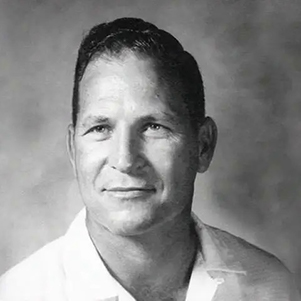
Al Bellotto
(1925-2019), was the son of an Italian immigrant and a Creek woman. Bellotto recalls growing up in western Polk County, working in citrus, cattle, and agriculture, and hunting and fishing as a youth. Bellotto served in the Pacific Theatre in World War Il. Returning to Polk County, Bellotto spent a lifetime in the cattle business, founding the Circle B Bar ranch, currently the Circle B Bar Reserve. Bellotto served as president of the Florida Cattleman’s Association and also on numerous boards of directors of agricultural farm credit organizations.
Subjects: Immigration, cattle business, World War II, Okinawa, Iwo Jima, Polk County Cattleman’s Association, Farm Credit, Screwworm Epidemic, Lawton Chiles, Congressman J. Hardin Peterson
| 8/11/05 Interview | |
| 8/16/05 Interview | |
| 8/18/05 Interview |
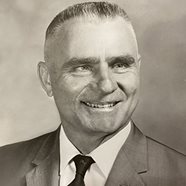
Sheriff Monroe Brannen
(1915-2006) migrated to Lakeland from Lake Butler, Florida in 1931. In 1939 he began a fifty year career in law enforcement when he joined the Lakeland Police Department. Wounded in the line of duty in 1949, Brannen was elected county constable in 1952, and then in 1960 was elected sheriff of Polk County, serving until 1976. A skilled grass-roots politician and fund-raiser for such organizations as the Florida Sheriff’s Youth Ranch, Brannen interacted with many politicians and other law enforcement officers during his years in office.
Subjects: Law Enforcement, Florida Politics, Glenn Dougherty, Spessard Holland, Claude Kirk, George Wallace, Civil Rights
| 05/22/97 Interview | ||
| 06/02/97 Interview | ||
| 03/09/00 Interview |
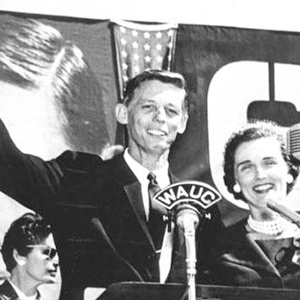
Doyle Carlton
(1922-2003) was a rancher, politician, and philanthropist. The son of the depression era governor and lawyer, Carlton built one of the largest cattle ranches in South Central Florida. In 1957, as a member of the Florida Senate, Carlton stood with Gov. Leroy Collins against an effort to close down public schools rather than comply with Supreme Court-mandated desegregation. In 1960 Carlton ran for governor, losing to segregationist Farris Bryant. In his later years, from his home in Wauchula, Carlton dedicated himself to philanthropic causes, including the Florida State Fair.
Subjects: Florida Politics, Florida Cattle industry, Screwworm Epidemic, George Smathers, Claude Pepper, Farris Bryant, Leroy Collins, Civil Rights, Dempsey Barron
| 10/15/02 Interview | |
| 10/23/02 Interview |
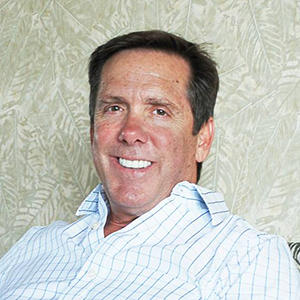
Ed Chiles
(1955- ), the son of Lawton Chiles, recalls and observes upon his life growing up with his family in Lakeland, Tallahassee, and Washington. He reflects on family outings and his father’s numerous political activities and campaigns as state legislator, U. S. senator, and governor.
Subjects: Florida State Legislature (1958-70), Wilbur Boyd, Hayden Burns, Louis de la Parte, Farris Bryant, Spessard Holland, Vietnam Demonstrations, Edmund Muskie, Sam Nunn, Mark Hatfield, Ted Stevens, Dale Bumpers, David Prior, Budget Committee Battles, Chiles’s Retirement from the Senate, Chiles’s run for governor 1990 and 1994, 1994 Gubernatorial Debate with Jeb Bush, Tobacco Legislation
| 6/22/04 Interview |
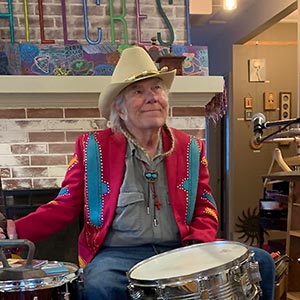
Jon Corneal
(1946- ) a musician, was born in Lakeland, Florida in 1946. He became an accomplished drummer in the rock and roll scene in Central Florida during the early 1960s. Corneal played in such bands as the Dynamics and the Legends, and with other musicians such as Carl and Gerald Chambers, Gram Parsons, and Jim Stafford. At the age of seventeen, Corneal moved to Nashville where he met Chet Atkins, Roy Acuff and numerous other stars in the Grand Ole Opry. After appearing in the movie, “Country Music, USA,” (1965), Corneal toured with the Wilburn Brothers, Kitty Wells, and Connie Smith. In 1967 Corneal moved to California, becoming an important ingredient in the newly forming “country-rock” genre. Reuniting temporarily with Gram Parsons, Corneal played for a time with the International Submarine Band and the Flying Burrito Brothers, before returning to Nashville. Before eventually returning to Florida in the 1980s, Corneal remained as a tenuous link between the California rock scene and Nashville. Along the way, Corneal played with numerous individuals including Loretta Lynn, Gene Clarke, Warren Zevon, and the Glaser Brothers.
Subjects: Central Florida Youth Music Scene early 1960s, Auburndale, Florida, Leroy Collins, Spessard Holland, Bobby Braddock, Jim Crow conditions in the South, Jim Stafford, Gram Parsons, “Cousin Jake” Tullock, Earl Ball, Nashville Music Scene 1960s, Roy Acuff, Chet Atkins, Grand Old Opry, Wilburn Brothers, Kitty Wells, Connie Smith, Texas Music Scene, Loretta Lynn, “Music City, USA,” 1965, Don Helms, Hank Williams, Hank Snow, Bob Wills, Roy Clark, Glaser Brothers, LA Music Scene, International Submarine Band, Flying Burrito Brothers, Joni Mitchell, David Crosby, Gene Clark, Troubadour, Jackson Browne, Waylon Jennings, Willie Nelson, Debbie Corneal, Limousine Cowboys, Charley Pride.
| 5/15/20 Interview | |
| 5/22/20 Interview | |
| 5/26/10 Interview |
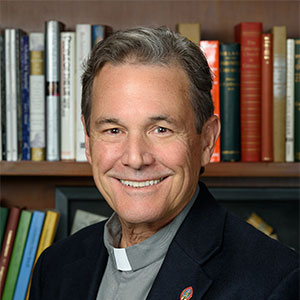
J. Allison Defoor
(1954- ) lawyer, public defender, prosecutor, judge, Monroe County Sheriff, Lt. Gubernatorial Candidate, Jeb Bush’s Everglades Czar and currently official in the Episcopal Diocese of Florida, recounts his years in politics in Key West beginning in 1979. DeFoor’s involvement in massive efforts to clean up corruption Key West and Monroe County government led to his election as prosecutor, judge, and eventually Sheriff of Monroe County before being tapped as Gov. Bob Martinez’s running mate in his 1990 re-election campaign.
Subjects: Key West Politics, Carl Hiaasen, Florida Republican Party, Drug Wars, Law Enforcement in the Keys, Environmental Movement, Florida Sheriffs Association, Bobby Brown, Bill Freeman, Jeb Bush, Key West Subculture
| 04/18/00 Interview |
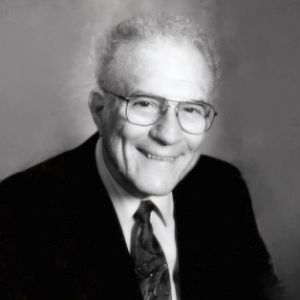
Carroll Gambrell
(1924-2016) was born in Birmingham Alabama and enrolled in the University of Alabama and was a mechanical engineering student when he joined the U. S. Army in 1943. After training at Fort Leonard Wood, the University of Wyoming and Yale, Gambrell arrived in Germany in January 1945. He served in a combat engineering unit that saw action in the Battle of the Bulge, the Remagen Bridge, and Central Europe. Gambrell returned home and earned a Ph. D in engineering from Purdue. He spent an active career as a professor and college administrator at Arizona State University, and was the first dean of academic affairs at Florida Technological University in 1968. In 1985 he became the first Dean of the engineering school at Mercer University.
Subjects: World War II, Engineering education, higher education, Bridge at Remagen, GI Bill, Army Scientific Advisory Panel and the Defense Science Board, Clemson University, Florida Technological University, Mercer University
| 3/19/15 Interview | |
| 3/26/15 Interview | |
| 4/02/15 Interview | |
| 4/20/15 Interview |

Hon. William Terrel Hodges
(1934-2022) was one of the most respected and honored federal judges in the United States. Appointed in 1971 by President Richard Nixon to the U. S Middle District of Florida, Hodges served in Jacksonville and Tampa throughout the 1970s-2010s. During those years he ruled on cases ranging from school desegregation, civil rights, the death penalty, racketeering, gambling, major drug cases, bribery and corruption of public officials, and international banking. Hodges grew up in Lake Wales, FL and attended the University of Florida, where he earned bachelor’s and law degrees. He practiced privately in the Macfarlane Ferguson & McMullen law firm in Tampa from 1958 until his appointment to the federal bench in 1971. He served as chief judge of the Middle District from 1982-1989. He was a member of the Judicial Conference of the United States from 1994 to1999, becoming chair of its Executive Committee in 1996.
Subjects: Claude Pepper, Ed Gurney, Edward Boardman, E. J. Salcines, Lawton Chiles, William Rehnquist, Ted Mack, Robert Merkle, legal practice in 1960s in Tampa, civil rights cases, school desegregation cases, old federal courthouse in Tampa, Bank of Credit and Commerce International BCCI case. Proffitt v. Florida death penalty case. U. S. District Judges Joseph P. Leib, George Whitehurst, Ben Krentzman, William Allison McRea, George Carr, Alfred Murrah, Anthony Aliamo, Frank Johnson, Gerald Tjoflat, Charles Scott
| 5/29/12 Interview |
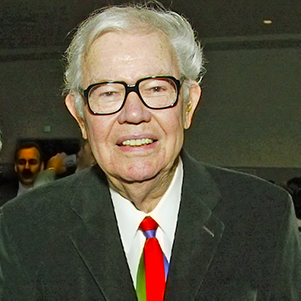
Homer Hooks
(1921-2014) was born in Columbia, SC but as a child moved with his family to Clermont, FL. Hooks attended the University of Florida, fought in World War II, earning two Bronze Stars and a Purple Heart. In the Korean conflict he served as a Captain in Army Intelligence. He enjoyed a long career and as a journalist and public relations professional for Florida Citrus enterprises, including being the first person to hold the position of Executive Director of the Florida Department of Citrus. In 1965 Hooks became the first Executive Director of the Florida Phosphate Council. He retired in 1986. The first interview deals primarily with Hooks’s memories of Lawton Chiles and his political campaigns and the second deals with Hooks’s service in World War II and Korea.
Subjects: 1958 campaign between Roy Surles and Lawton Chiles, Florida Politics, LeRoy Collins, Bill Gunter, Ed Price, Wilbur Boyd, Ed Ball, Ed Gurney, Spessard Holland, 1970 Senate Race, Bill Nelson, 1990 Governors Race, University of Florida 1939-1943, Officers Candidate School, Assignment of 102nd Division, combat in rifle platoon, Landing at Cherbourg in Sept 1944, memories of combat, Battle of Bulge, Paris, rapid movement to Elbe River, German surrender, occupation duty, George Marshall, Korean War
| 7/29/03 Interview | |
| 6/21/05 Interview |
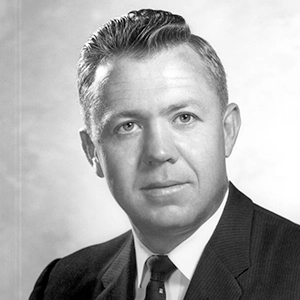
Scott Kelly
(1927-2005) was a charismatic developer, builder and politician who ran for governor unsuccessfully in 1964 and 1966. Born in Madison but spending his young adulthood in Quincy, Florida, Kelly migrated to Polk County in the 1940s and pursued real estate. At the age of 27 he became Lakeland’s youngest mayor. He served eight years in the Florida Senate. His continued interest in politics inspired many elected officials in both local and state offices.
Subjects: Tobacco farming, University of Florida, FHA and VA housing program, real estate, early interest in politics, Fuller Warren, Kefauver Committee, Judge Clifton A. Kelly, 1956 Florida Senate Race, Lakeland city politics, Florida Senate Road Building Investigations, 1964 and 1966 Democratic Primary for Governor, Robert King High, Hayden Burns, Chesterfield Smith, Roy Surles, Lawton Chiles and Farris Bryant.
| 6/26/03 Interview |
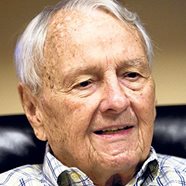
D. Burke Kibler
(1924-2009) was one of Florida’s pre-eminent trial lawyers of the 1950s-1990s. A lifelong resident of Lakeland, Kibler graduated from high school in 1941, attended the University of Florida briefly before serving in the Army as an artillery forward observer during World War II. He was awarded the Bronze Star with "V" and the Purple Heart with Oak leaf Cluster. In 1949 Kibler graduated from the University of Florida Law School and began practicing with his father-in-law, Thomas W. Bryant, in Lakeland, FL. In 1964 he became a partner in the law firm of Holland, Bevis Smith, Kibler & Hall. In 1968 that firm merged with the Tampa firm of Knight, Jones, Whitaker & Germany, and became Holland & Knight, now one of the nation's largest leading law firms. Mr. Kibler served as Chairman of the Board of Directors of Holland & Knight from 1983 to 1995 and was awarded the title of Chairman Emeritus. He remained in the Army Reserves for 14 years, reaching the rank of major. He was an advocate for higher education and served as Chairman of the Board of Regents, the former governing body for Florida's university system, and on the Council of 100, the Governor's advisory board. He also served as general counsel of the Florida Citrus Commission and the Florida Phosphate Council. He served as Director of numerous corporations, including Florida National Bank, Florida Federal Savings and Loan Association, Citrus & Chemical Bank, Bok Tower Sanctuary, Inc., The Florida House, Orange Bowl Committee, Lakeland Economic Development Council, and Southeastern Legal Foundation, Inc.
Subjects: Early Lakeland History, Student life at University of Florida, World War II, African-American involvement in; segregation, reflections on phosphate business, John F. Kennedy, Chesterfield Smith, Thomas Bryant, Charley Johns, Johns Committee, Dan McCarty, Homer Hooks, Scott Kelly, Spessard Holland, Pepper-Smathers race (1950), George Smathers, Leroy Collins, formation of Holland and Knight Law firm, political career of Lawton Chiles, 1970 Senate Race, Farris Bryant, Claude Kirk, Florida Board of Regents, Reubin Askew, 1988 Senate Race
| 3/10/03 Interview | |
| 3/17/03 Interview | |
| 3/24/03 Interview | |
| 3/31/03 Interview | |
| 4/07/03 Interview | |
| 4/13/03 Interview |
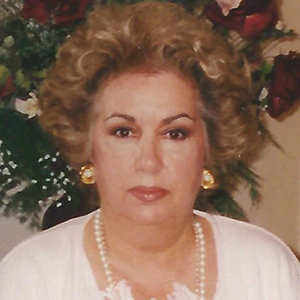
Norma Labato
Labato (1934- ), the daughter of a barber and a cigar maker, Norma Labato was born and grew up in Ybor City, Florida. Labato talks about growing up in the tri-lingual (English, Spanish, and Italian) community in Tampa. Labato taught school in Tampa from 1956-1991. She reflects on the conditions in the schools during those years, especially during in the years of integration.
Subjects: World War II, McCarthyism Brown vs. Board , JFK visit to Tampa in 1963, lunch counter demonstrations, bi-lingual education, Title IX federal lawsuit
| 11/04/15 Interview |
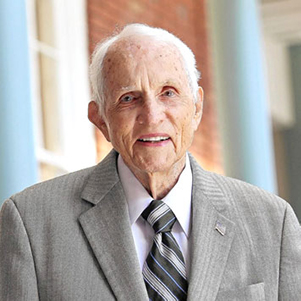
John Land
(1920-2014) was the longest continuously serving mayor in Florida history. Land served as Apopka’s mayor for sixty-one years. Elected in 1949, he served until 1969 when he was defeated. Re-elected in 1970 he served until 2014. Born in Plant City, Florida, Land moved to Apopka where his family owned a lumber mill. Land attended the University of Florida until enlisting in the army in World War II in 1942. Serving in Patton’s army he was present at the liberation of Dachau concentration camp. Land reflects on the various stages of his life and on his trials and tribulations as mayor of Apopka.
Subjects: Apopka and surrounding area 1920s-1940s, trips to Orlando, Rock Springs, Wekiva Springs, Consumer’s Lumber and Veneer Company, Ocoee Racial incident (1920), World War II, Post-War Florida politics, reflections on John Martin, David Scholtz, Fuller Warren, Spessard Holland, Hayden Burns, George Smathers, Farris Bryant, Lawton Chiles, Citrus Industry, Hayden Burns-Walt Disney Meeting in Orlando, Apopka mayoral issues Civil Rights, NAACP, Dowdell v. City of Apopka, Foliage Industry, Citrus Industry
| 8/22/08 Interview | |
| 9/26/08 Interview |
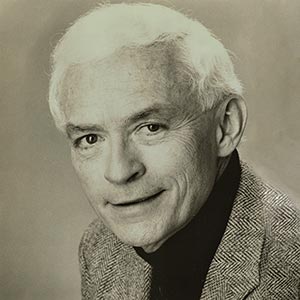
Robert MacDonald
(1930-2013), a world-renown pianist, professor, and artist-in-residence at Florida Southern College, influenced hundreds of students in a career that spanned nearly 50 years. One of eight children born and raised on a farm in Dillon, SC, only two miles from the NC border, Robert MacDonald grew up in a tidewater community settled by Scottish pioneers in the eighteenth and nineteenth centuries. Brought up in a household that valued hard work, education, and strict adherence to the Presbyterian faith, MacDonald had a natural talent for music, which he advanced while earning a bachelors’ degree in the subject at the University of North Carolina, and later a masters’ degree from Indiana University. Training at the Austria Conservatory (where he met and married his life-long companion Ingrid, an actress), MacDonald earned an Artist Diploma while further honing his skills as a professional pianist. MacDonald performed in New York and other locales before accepting a position at FSC in 1962 as artist-in-residence and department chair of Music. Among many of his accomplishments at FSC was creating and developing its acclaimed annual Festival of Fine Arts.
Subjects: Great Depression, North Carolina agriculture and rural life, share-cropping, race-relations, Presbyterian Church, World War II home-front, University of North Carolina, travel in Cuba, Charles MacDonald, Donald MacDonald, Highland Games, Air Force, Andy Griffith, Austria Conservatory (Academy of Music), Manhattan, Charles Thrift, Florida Southern College, Lakeland, Florida, Civil Rights Movement, FSC Festival of Fine Arts.
| 11/18/10 Interview | |
| 11/23/10 Interview | |
| 11/30/10 Interview | |
| 12/14/10 Interview |
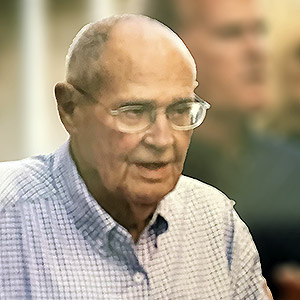
Ephraim Martin
(1933-2021) Born in Ocala but raised in Lakeland, Snow Martin attended Lake Morton Elementary School, Dixieland Grammar School and Lakeland High School. He then attended the University of Florida, where he was a member of Alpha Tau Omega fraternity and Florida Blue Key. He was admitted to the University of Florida Law School and graduated in the top three of his class.
He returned to Lakeland where he worked as a public defender before joining the law practice of Bryant, Martin & Kibler. Snow and his father founded the Martin & Martin law firm where he remained active until the time of his death. Snow served as the president of the Lakeland Area Chamber of Commerce, served on the Lakeland Economic Development Council, and as an advisor to the Blanton Foundation.
Subjects: Lawton Chiles, Rhea Chiles, Burke Kibler, Buddy MacKay, George Carr, Bill Ellsworth, Scott Kelly, Sarah McKay, Bob Martinez, University of Florida in 1950s and 1960s, local and state politics, practice of law in the 1960s and 1970s.
| 04/16/04 Interview | |
| 04/23/04 Interview |
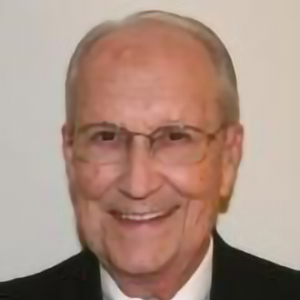
Gene Parks
(1929-2015) was born and raised on a share-crop farm in Mississippi in the Great Depression. He attended Vanderbilt Seminary dedicated his life to the service of the poor and disadvantaged. He began this service as chaplain in the maximum security section in the Tennessee State Prison in Nashville. In 1956 Parks was appointed pastor of the English speaking First Methodist Church of Havana. Parks reflects on his three years in Havana and the onset of the Cuban Revolution. After leaving Havana in 1960 Parks headed congregations in Miami and Jacksonville. In the late 1960s Parks became the first leader of the first Urban Ministries of the Florida United Methodist Conference, which became the Methodist Church’s outreach ministries that grappled with such issues as civil rights, women’s rights, and the rights of farm workers.
Subjects: share-cropping, logging business, Great Depression, Jim Crow system, California in 1930s, prison ministries, Gov. Frank Clement, Methodist Conference of Florida, Havana, Cuban Revolution, Methodist Church in Cuba, Civil Rights Movement, Cesar Chavez, Planned Parenthood, Urban Ministries of the Florida United Methodist Conference
| 10/27/09 Interview | |
| 10/29/09 Interview | |
| 10/30/09 Interview |
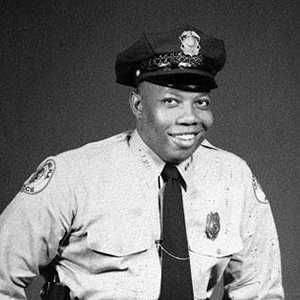
Edgar Pickett
(1928- ) was one of four other African-Americans appointed to the Lakeland Police Department by Police Chief Leo Brooker in 1954. Pickett shares stories of his early life growing up in Lakeland, of his father working in the McKay furniture store, and running a small store. He speaks of his early experiences on the police force, his FBI training as a finger print specialist, and of his being shot in 1964. He reflects on the Civil Rights Movement, School Desegregation, the FBI, and Jimmy Carter’s visit to Lakeland.
Subjects: Neil Brooker, Herbert W. Straley, Pat Gordon, Monroe Brannan, Louis Mims, Glenn Dougherty, Walter Manley, Lawton Chiles and Lawrence Crow, Ku Klux Klan
| 2/25/10 Interview |
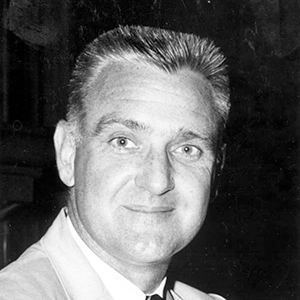
Edgar Price
(1918-2012), was born in Jacksonville and grew up the Sarasota-Bradenton area during the Great Depression. Price attended the University of Florida briefly before entering the military after America entered World War II. Trained as a pilot Price flew bombing missions over Germany beginning in 1945. After the war, Price worked in various businesses including the Florida Chamber of Commerce and Tropicana Company. Price represented Bradenton in the Florida Senate from 1958-1966. Throughout his active business and political career he met and interacted with many influential persons who helped shape the economic and political history of Florida.
Subjects: Florida Boom, Great Depression, University of Florida, World War II (1941-42), bombing missions over Germany. Reflections on Eleanor Roosevelt, George Smathers, Claude Pepper, Doyle Carlton, Dan McCarty LeRoy Collins, James Haley, John Ringling, Spessard Holland, Chesterfield Smith, Anthony Rossi, Verle Pope, Scott Kelly, Doyle Carlton, Dempsey Barron,“Pork Choppers,” Lyndon Johnson, Civil Rights Act, Charley Johns, Johns Committee, Governorship of Leroy Collins, Last Resort Bill, 1968 Senate Race Collins vs. Bryant, Lawton Chiles
| 6/25/03 Interview | |
| 8/13/03 Interview |

Robert E. Puterbaugh
(1944-) was born in Dayton, Ohio but grew up on Crooked Lake in Babson Park, Florida, where his parents operated a marina. As a young person he enjoyed water skiing and boating activities. After graduating from Lake Wales High School, he attended Stetson University, pursued ROTC, and then graduated from Stetson College of Law in 1969. Commissioned an officer in the United States Army, Puterbaugh joined the Judge Advocate General’s Corps (JAG), serving in Texas and in the Republic of Korea. In 1974 he returned to Central Florida and participated in the formation of the Peterson & Myers law firm in Lakeland. In the following years he became one of Florida’s most distinguished trial lawyers, practicing in both state and federal courts. His clients have included Barnett Bank, Lakeland Regional Medical Center, Florida Southern College, and the Polk Museum of Art (now AGB Museum of Art). Throughout his career he has contributed his time to many pro bono causes, and national legal organizations, including the National Legal Center for the Public Interest in Washington D.C.
Subjects: Polk County, FL (1950s-2020s), Race Relations, Hurricane Donna, Stetson University, ROTC, Stetson College of Law, Harold “Tom” Sebring, Cuban Missile Crisis, JAG Corps, Korea (1971-74), Vietnam War, Peterson & Myers Law Firm, Racketeering Influence and Corrupt Organizations (RICO) Act, SH Oil Gas Exploration (Ponzi scheme), Florida Southern College, Judicial Nominating Process (state and federal), National Legal Center for the Public Interest.
Reflections on Alexander Paskay, Maury Maverick, Jr. Lawton Chiles, J. Hardin “Jay” Peterson, Jack Edmund, Terry Smiljanich, Robert Merkle, Steve Smith, Mark Miller, Charles Rice, Anne Kerr, Jerry Hill, Quillian Yancey, U. S. District Judges Ben Krentzman, Terrell Hodges, George Carr, Elizabeth Kovacovich, Virginia Covington, and state circuit judges Clifton Kelly, John Dewell, Oliver Green, Gunter Stevenson, and Susan Roberts
Legal cases: United States vs. Ivory Lee Wilson, et. al. 1977, S & H Oil cases (state & federal), Pacific Harbor Capital Inc. vs. Barnett Bank,.1997-2001, Lady Di Fishing Team, LLC, vs Brunswick Corporation, 2008, Chalet Suzanne Trademark Litigation, 1977.
| 8/12/25 Interview | |
| 8/28/25 Interview | |
| 9/2/25 Interview |
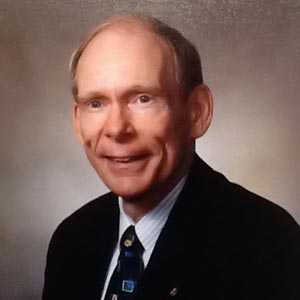
Thomas Reuschling
(1942- ) Reuschling served as President of Florida Southern College from 1994-2004. Born in Ohio and graduating with a degree in economics from Hiram College, Reuschling excelled in athletics. He eventually completed an MBA from Kent State University and a Ph.D from the University of Colorado. Reuschling enjoyed a long career as a college educator and administrator. Before coming to Florida Southern, he held teaching appointments at Kent State University and at the University of Northern Iowa where he became chair of the Business Department. After spending ten years as head of the University of Richmond’s School of Business, Reuschling became president of the St. Andrews College in North Carolina. On December 2, 1994, Reuschling was inaugurated sixteenth president. During his tenure he made it a priority to interact with students, and created a tradition of walking around the campus. He focused on growing and retaining students, as well as building the endowment. His successful fundraising efforts led to several building projects, including the Hollis Wellness Center, and many building renovations. His off-campus leadership included serving as Chair of the United Way of Central Florida and on the boards of the Lakeland Area Chamber of Commerce, Success by Six, and the Lakeland Community of Independent Colleges and Universities of Florida.
Subjects: Ohio (1940s-1950s), College Athletics, Kent State Shootings, St. Andrews College, Florida Southern College, College Administration, Lakeland, Florida
| 8/3/20 Interview | |
| 8/5/20 Interview | |
| 8/7/20 Interview |
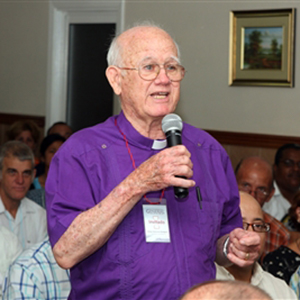
Bishop Armando Rodriguez
(1929- ), was born on his parent’s sugar cane farm in Cienfuego Province, Cuba. Trained as an accountant, Rodriguez worked in a sugar mill for eight years, and attended the University of Havana. Rodriquez reflects on the political upheavals at the University and in Cuba in the 1940s and 1950s and his brief career in politics as member of the Orthodoxo Party. After his conversion to the Christian faith Rodriguez entered the Matanzas Seminary in 1954. Rodriguez recalls his experiences as a pastor leading up to, and after, the Cuban Revolution. He was among a handful of Methodist clergy who remained in Cuba and united to keep the Methodist Church in Cuba alive. In 1968 autonomy of the church was declared and Rodriquez was elected the first Cuban Bishop. He served twenty-two years in the post until 1990, and strove to make the church self-supporting. Rodriguez recounts his experiences working within the constraints of the Castro regime. After his retirement in 1990 Rodriguez served as a missionary in Honduras with the United Methodist General Board of Global Ministries, and as pastor in numerous churches in Florida.
Subjects: Cuban religious, political, economic, and social life (1930s-1990). Sugar Industry, Reflections on Gerardo Machado, Mario Garcías Menocal, Fulgencio Batista, Grau San Martin, Eduardo Chibas and Orthodoxo Party, Fidel Castro, Matanzas Seminary, Evangelism in Cuba, Methodist Church in Cuba, United Methodist General Board of Global Ministries, Mariel Boatlift, Jesse Jackson
| 4/09/08 Interview | |
| 4/14/08 Interview | |
| 4/17/08 Interview | |
| 4/22/08 Interview | |
| 4/28/08 Interview | |
| 5/12/08 Interview | |
| 5/15/08 Interview | |
| 5/20/08 Interview | |
| 5/27/08 Interview | |
| 5/30/08 Interview | |
| 6/03/08 Interview | |
| 6/05/08 Interview | |
| 6/09/08 Interview | |
| 6/11/08 Interview |
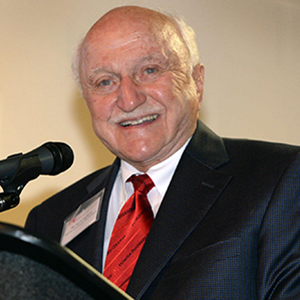
Joe Ruthven
(1927-2019) was born on a farm in Chesterfield, South Carolina and attended the University of South Carolina where he met his future wife Jeanette Chiles, the sister of future U. S. senator Lawton Chiles. After graduation Ruthven worked in Charlotte and Shelby, N. C., before relocating permanently in Lakeland, Florida, in 1957 where he pursued business, politics, and philanthropy. The founder of The Ruthvens, a company specializing in building warehouses and distribution centers, Ruthven reflects on his business enterprises, his stint as mayor of Lakeland in the early 1970s, and the political campaigns and career of his brother-in-law Lawton Chiles.
Subjects: South Carolina agriculture, business, Florida politics, Lakeland history, Lawton Chiles political campaigns
| 1/06/04 Interview | |
| 2/09/04 Interview |
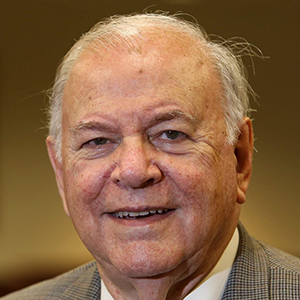
E.J. Salcines
(1938- ) was born in West Tampa, the son of parents born in Spain. He reflects on growing up during World War II and working in his father’s department store. Salcines attended Florida Southern College and law school in Houston, Texas. Salcines reflects on his days at Florida Southern College, working as an assistant U. S. Attorney (1964-1968), and later Hillsborough state prosecutor, serving for sixteen years. In 1998 he was appointed to the 2nd District Court of Appeal by Gov. Lawton Chiles. Throughout his long career in the law, Salcines earned many accolades and serves on many boards of directors. He is a popular public speaker and historian.
Subjects: Florida Southern College, West Tampa history, reflections on Lawton Chiles, Chiles-Cramer 1970 Senatorial Race, Bob Graham, U. S. Middle District Court of Florida, J. Edgar Hoover, Edward F. Boardman, Robert Knight J. Hardin Peterson, Judges George Young, Joseph P. Leib, Clarence Allgood, Albert Reeves. Skyway Bridge Disaster, Proffitt v. Florida death penalty case, Robert Shevin, drug trafficking, Robert Merkle
| 5/19/04 Interview | |
| 7/26/10 Interview | |
| 8/3/10 Interview |
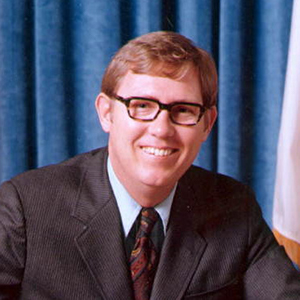
Terrell Sessums
(1930-2020) was raised in Jacksonville and attended the University of Florida, earning both a bachelors and law degrees. He was president of the UF student body in 1952-1953. He served briefly in the U. S. Air Force. He practiced law in Tampa and served in the Florida House of Representatives from 1963-1974. He was Speaker of the Florida House of Representatives from 1972-1974. He served as chairman of the Florida Board of Regents and on the boards of trustees at Florida Southern College and the University of Tampa.
Subjects: University of Florida, Florida Politics, Pork-Choppers, Sam Gibbons, Manning Dauer, Reapportionment, Baker v. Mann, Florida legislature 1956-1974, Lawton Chiles, LeRoy Collins, Cherokee Hotel, Last Resort Bill, Scott Kelly, Charley Johns, Doyle Carlton, Doyle Conner, Louis de la Parte, Hayden Burns, Ed Price, Road Bond Amendment, Bill Cramer, 1970 Senate Race, 1972 Democratic Convention in Miami, Reubin Askew, Bob Martinez, Buddy McKay, 1990, 1994 Gubernatorial Race, Jeb Bush
| 8/07/03 Interview |
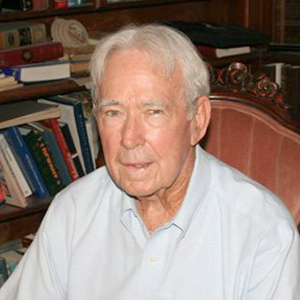
Dan Warren
(1925-2011) was born in Concord, North Carolina, attended Guilford College, and served as a B-24 nose gunner in Italy during World War II. He attended Stetson Law School and practiced law in Daytona Beach for over sixty years. Was state attorney for Florida’s Seventh Judicial Circuit during the St. Augustine Racial Disturbances of 1964, and participated directly in negotiations between civil rights leaders and local and state authorities. In 1968 Warren returned to his law practice and spent much of the remainder of his career defending the rights of others, especially minorities. He has written extensively on constitutional rights, especially the First Amendment (free speech and free press), Fourth Amendment (unlawful search and seizure) and Fifth Amendment (self-incrimination). He has received the NAACP Trail Blazer Award and the Dr. Martin Luther King, Jr. Civil Rights Award. He is the author of If it Takes all Summer: Martin Luther King, the KKK, and States’ Rights in St. Augustine, 1964 (2008). In this interview Warren reflects primarily on practicing in the federal court in the 1960s-1980s.
Subjects: Racketeering Influence and Corrupt Organizations (RICO) Act, Reflections on Judges George C. Young, Earl Warren, Gerald Tjoflat, Bryan Simpson, Elbert Tuttle, William Allison McRae, Ben Krentzman, Joe Hatchett, George Carr, Howell Melton, and William O. Mehrthens; Fifth Circuit Court of Appeals, Farris Bryant, Sheriff L. O. Davis, Southern Christian Leadership Conference (SCLC), Santo Trafficante, Bolita, Harlan Blackburn, Frank Ragano, Tobias Simon
| 5/26/10 Interview |
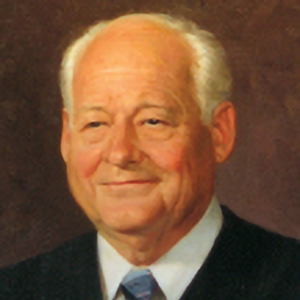
George Young
(1916-2015) was one of the most respected and honored federal judges in the United States. Appointed in 1962 by President John Kennedy, Young served in Orlando throughout the 1960s-2000s. During those years he ruled on cases ranging from school desegregation, civil rights, the space program, construction of major roadways in the area, racketeering, gambling, drug and alcohol importation, bribery and corruption. His most active service on the bench came at a time when he was the only federal judge in the Orlando. Young moved from Cincinnati to Daytona Beach with his family at an early age. He attended Rollins and the University of Florida, where he earned bachelors and law degrees. He entered the navy during World War II, serving until 1946 when he took a job as chief of staff from his law-school colleague George Smathers. In 1951 he practiced privately in Jacksonville until his appointment to the federal bench in 1961. Young’s interview addresses primarily his time on the federal bench.
Subjects: Young’s appointment and early years on the bench in Orlando, reflects on John Kennedy, George Smathers, Spessard Holland, Condemnation Cases, reflections on Judges William Allison McRae, George Whitehurst, John Reed, Alexander Paskay and assistant U. S. attorneys Kendall Wherry, E. J. Salcines, Arnold Levine. Reflections on Chesterfield Smith, Harlan Blackburn, Sen. Ed Gurney corruption case.
| 8/14/11 Interview |
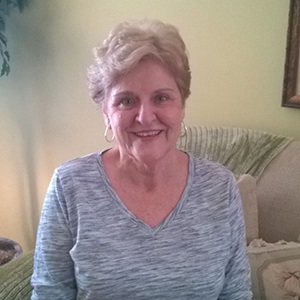
Gail Ulrey
(1942- ) shares stories of her life growing in Lakeland in the late 1940s, 1950s and 1960s. She attended Dixieland elementary and Lakeland High School. She speaks of her memories of the Polk Theatre, downtown department stores, and playing on the campus of Florida Southern College. She was at the Polk Theatre when Elvis Presley performed there in 1956. Ulrey eventually married and endured several years alone when her husband served in the Vietnam War. She also shares her memories of Martin Luther King, popular movies, songs, and television of the 1950s and 1960s.
Subjects: Florida Southern College, Ku Klux Klan, Race Relations, Civil Rights, Elvis Presley, Vietnam War, Dick Clark, American Bandstand, Vietnam War, Neva Jane Langley
| 11/8/17 Interview |